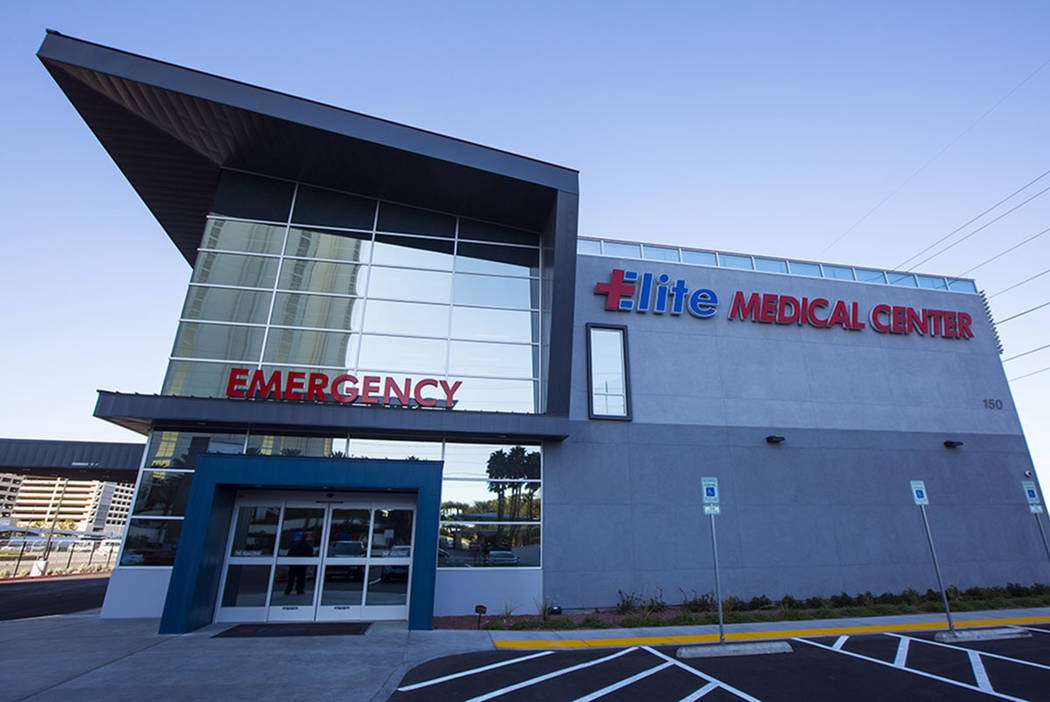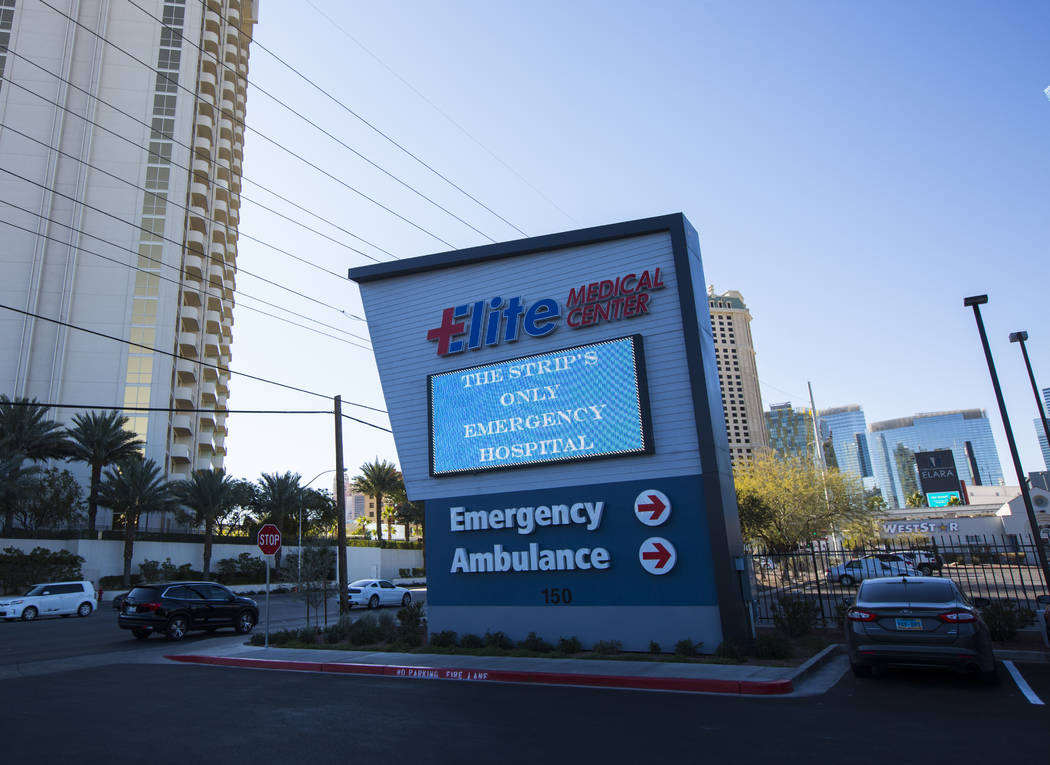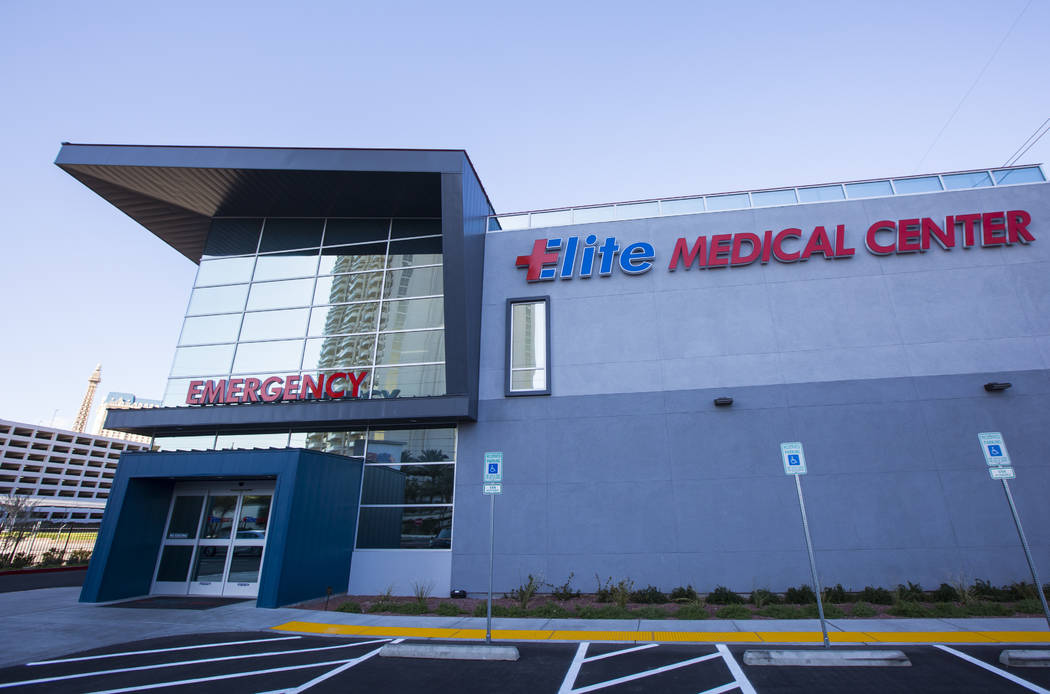Emergency room off Las Vegas Strip makes waves with new business model



A doctor assured DeAnn Allen that the trace of blood in her urine after a car crash was just a little bruising, but she wouldn’t have guessed it by the size of her bill.
That urine test and visit with the doctor cost Allen, who was visiting Las Vegas, more than $1,800.
“If you care about your care, and have a choice, we urge you to go somewhere else!” Allen wrote in a review on Facebook for Elite Medical Center, Las Vegas’ newest emergency hospital, located just west of the Strip.

Just like any full-service emergency room, Elite Medical Center treats a range of urgent medical problems, from headaches to heart attacks. But unlike at the other ERs in Southern Nevada, you’ll generally pay more for your care.
That’s because the facility doesn’t contract with any insurer. So if you break a bone or your child has an earache and you go there, you’ll be paying for out-of-network care.
Unaccredited and out-of-network
Elite is licensed as a hospital by the state, but experts say it is operating similarly to free-standing emergency rooms that have become common recently in other states. It is the only unaccredited hospital in Clark County that provides emergency care but doesn’t contract with insurers.
Free-standing ERs have been scrutinized by researchers, who say they often provide services available at an urgent care clinic while charging more.
Invented in the 1970s to serve areas, often rural, where care was sparse, they have particularly proliferated in Texas over the last decade, said Dr. Jay Schuur, head of emergency medicine at Lifespan, a health system in Rhode Island affiliated with Brown University.
“If you talk to people who run free-standing emergency departments, they will point out that they can often do things more rapidly and at lower cost than on the hospital side,” said Schuur, who has spent years researching them. “But they also … don’t have access to the full range of emergency services.”
There’s no license for a free-standing ER in Nevada, though hospitals are allowed to open satellite emergency rooms that provide care at other locations.
Elite Medical Center pursued a different path by getting the state to license it as a hospital. That means the facility has the capacity to keep patients for 48 hours.
State law doesn’t mandate that these facilities be accredited by the federal Centers for Medicare or Medicaid Services or accept any insurance, private or public.
Those unaccredited, non-CMS-certified hospitals also don’t have to follow the Emergency Medical Treatment and Labor Act, University Medical Center CEO Mason VanHouweling pointed out Tuesday at a Clark County Commission meeting, meaning the facility technically could ask patients for payment or insurance information before ever stabilizing their condition.
“We don’t think that’s appropriate,” said Bill Welch, president and CEO of the Nevada Hospital Association, which represents UMC and 65 other medical facilities statewide. “We think that Elite Medical Center, if they want to operate as a hospital in the state, that they should operate as a CMS-certified center and they should be accredited and Medicare-participating. Without those things, we’re concerned.”
‘Highway robbery’
Dr. Shannon Orsak and his brother, Brian Orsak, opened St. Michael’s Emergency Room in Sugar Land, Texas, more than a decade ago. It’s a free-standing ER which, like Elite Medical Center, doesn’t contract with insurers.
The Orsak brothers are listed as managers for Elite Medical Center on the Nevada secretary of state’s website.
“Our understanding is that’s what they initially had hoped to facilitate in Nevada, but because of the way our law is written, they had to build a microhospital,” Welch said.
Vivian Ho, a Rice University researcher who studies free-standing ERs, compared the business model to “highway robbery.” While an in-network facility charges patients the copay and coinsurance at rates their insurers have negotiated, an out-of-network provider can ask for payment from an insurer, then charge the patient the rest, whatever that may be.
“There’s tremendous overlap between the diagnoses seen at urgent care centers … but the prices by diagnosis and procedures are 10 times higher in a free-standing ER,” Ho said.
One of the most common procedures, she found: urinary test. Just like the one DeAnn Allen received after her car accident.
Margot Chappel, deputy administrator for regulatory and planning services at the Nevada Department of Health and Human Services, said Elite’s placement adjacent to the Strip means it’s likely focused on serving tourists. And just as convenience stores and shopping centers charge more on the Strip, Elite Medical Center could do the same.
“Health care is still a very for-profit industry,” she said.
Rarely on the hook
In an emailed statement, Elite Medical Center CEO Butch Frazier defended the facility and pointed to its online ratings as proof it is delivering quality care.
He noted that Elite’s ratings, from 4 to 4.8 stars depending on the website, are higher than UMC’s and said he was taken aback by VanHouweling’s comments at the County Commission meeting.
Frazier said he sensed “an element of jealousy in their complaints, as we have never before elsewhere in the country seen medical providers be so vocal in trying to ‘protect’ the patients of a competing provider.”
VanHouweling did not mention Elite Medical Center by name in his Tuesday presentation. UMC officials didn’t make him available for comment Friday.
Frazier said there is “a smidgen of truth” in the statement that because Elite is an out-of-network facility, its patients could be left on the hook for their medical costs. But he said that is rare, adding that insurers are sometimes reluctant to contract with hospitals unaffiliated with chains.
“EMC tries hard to make sure that the ultimate charges paid by the patients and by the insurers to EMC are in line with what they are paying for the same services at other hospitals in the area,” Frazier said.
The facility is seeking CMS-approved accreditation, he added.
Getting legislators on board
Ho, the Rice University researcher, said elected officials can keep free-standing ERs and facilities like them from cropping up by passing laws and ordinances.
“It’s a matter of your state legislators getting a hold of this early,” she said.
Clark County Commission Chair Marilyn Kirkpatrick requested at Tuesday’s meeting that county staffers draft an ordinance that would preclude local hospitals from forgoing CMS certification.
Legislators also are looking at tackling surprise billing in the upcoming session, which begins next month, and they could effectively render out-of-network billing ineffective. The practice puts responsibility on patients for the portion of a bill their insurer didn’t cover, at a rate determined by the hospital.
“That is absolutely everything we’re trying to avoid with the balance billing legislation,” said Assemblyman Mike Sprinkle, D-Sparks, who’s leading the efforts as chair of the Assembly Committee on Health and Human Services.
Sen. Joe Hardy, R-Boulder City, is taking a stab at similar legislation, which would mandate that hospitals and insurers negotiate a charge that is deemed reasonable.
Contact Jessie Bekker at jbekker@reviewjournal.com or 702-380-4563. Follow @jessiebekks on Twitter.
Microhospitals and satellite ERs
Across town, hospital groups have opened their own satellite emergency departments and microhospitals. HCA’s Southern Hills Hospital runs ER at the Lakes in the Summerlin area.
Spring Valley Hospital, part of the Valley Health System, runs ER at Blue Diamond — which the hospital calls a freestanding ER on its website.
The Dignity Health-St. Rose Dominican Hospitals run four microhospitals they call “neighborhood hospitals,” including one in North Las Vegas, where there has long been an unfulfilled need for medical care, CEO Laura Hennum said.
Unlike a freestanding ER, the facility can keep patients overnight and is building medical offices and a wellness center in the same building, so patients can be referred to primary care after an ER visit.
“We want to be part of the fabric of the community,” Hennum said.













